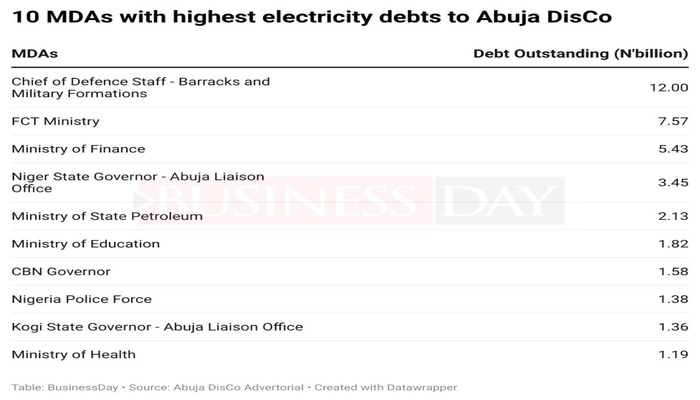Despite boasting million-naira electricity budgets, many government ministries, departments and agencies (MDAs) are among the top debtors of electricity distribution companies (DisCos), further crippling the already struggling power sector.
Unlike ordinary businesses or individual consumers who get disconnected from the power supply for failure to pay bills, MDAs enjoy continuous access to power supply despite reminders by the Nigerian Electricity Regulatory Commission on the rights of the DisCos to disconnect MDAs that refuse to pay bills.
Data obtained by BusinessDay showed that the Ministry of Defence owed Abuja DisCo at least N12 billion as of December 2023 despite having a yearly budget of N35 million for electricity charges for its headquarters operations in Abuja.
“Most of these debts by MDAs were accumulated over the years, although some of them are unverified debts,” said Aisha Mohammed, an energy analyst at the Lagos-based Center for Development Studies.
“Nigeria’s rising budget deficit is also having a multiplier effect on some MDAs; some of them struggle to implement 60 percent of the budget due to lack of funds,” she added.
BusinessDay’s findings showed the Presidential Villa owed Abuja Electricity Distribution Company (AEDC) N923 million despite having a budget of N360 million for electricity charges in 2023 and N354 million for 2022.
For the Ministry of Defense, the government parastatal owed Abuja DisCo N5.43 billion despite having a budget of N121 million for its headquarters electricity charges in 2022 and another N121 million in 2023.
Ministry of Education had a debt of N1.82 billion with Abuja DisCo despite having a budget of N6.2 million for electricity charges in its headquarters operations in 2023.
Also, the Ministry of Health recorded a debt of N1.19 billion with Abuja DisCo despite having a budget of N14.75 million for its headquarters electricity charges in 2023.
“These MDAs have no business having these huge bills if they committed to paying their bills for years,” Mohammed said.
Other critics and analysts have raised questions about the government’s accountability and fiscal responsibility in light of these revelations.
They stressed the importance of transparency and adherence to contractual agreements to prevent such instances in the future.
Mayowa Balogun, an economist, expressed scepticism on social media platform X, saying: “Who is deceiving who? The problem is from the government, not only do they lag on subsidies, they don’t pay their subsidised bills either.”
Ken Uttih, an energy professional, expressed dismay, saying: “Too many problems in this geographical expression. See how much the government is owed, even the so-called presidential villa. How can we achieve a constant electricity supply if this is happening?”
Last May, Danladi Baba, regional manager of the Abuja DisCo, said that the Kogi State government owed N483 million for electricity bills as of April 2023.
However, new data from Abuja DisCo revealed the Kogi State Governor-Abuja liaison office owed the electricity company about N1.4 billion.
Abuja DisCo revealed that its previous attempts to make the MDAs honour their obligations have not achieved the desired result.
“The relevant MDAs (as listed above) are hereby given notice that AEDC shall after the expiration of 10 days from the date of this publication, that is, after Wednesday, 28th February 2024, embark on disconnection of our services to them until they discharge their obligations to us by paying their debts,” Abuja DisCo said.
Tinubu directs payment of Aso Villa’s N342.3m debt to AEDC
Meanwhile, President Bola Tinubu has directed immediate payment of the outstanding electricity bill owed to AEDC.
In a statement on Tuesday by Bayo Onanuga, special adviser to the president on information and strategy, both the State House and AEDC have agreed that the outstanding bill is N342.3 million, and not N923.8 million as initially disclosed in a newspaper publication on February 19, 2024.
Femi Gbajabiamila, chief of staff to the President, said the outstanding amount will be settled with AEDC by the end of the week.
“In alignment with the actions taken by the Presidency, it is imperative for other Ministries, Departments, and Agencies to review their financial records with AEDC and settle any outstanding electricity bills promptly,” he said in the statement.

